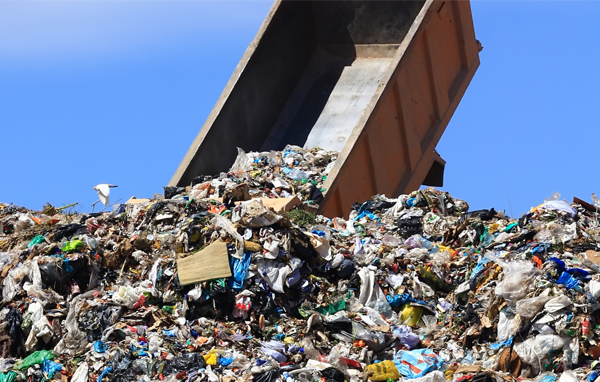The Food and Beverage Recycling Alliance (FBRA) has partnered with the Lagos State Government to address packaging waste with the “Trash Talk” campaign to tackle pollution.
At a workshop to kick-start the partnership, which was held at the Lagos Marriott Hotel, Ikeja, engaged stakeholders across the packaging and bottling industries, government agencies and FBRA to enforce a collective responsibility for packaging waste in the state by reviewing Lagos’ current recycling position and defining next steps to promote a cleaner Lagos.
Under the theme: “Beating Packaging Waste Pollution in Lagos by 2025”, the summit featured a range of educational sessions and speaking engagements led by representatives from the private and public sectors.
Daily Trust recalls that the Lagos State Governor, Babajide Sanwo-Olu, at a recent event, said the state being a megacity with an estimated population of 22 million inhabitants generated about 870,000 tonnes of plastic waste annually which constituted about 15 per cent of the total waste generated in the state.
- Why we killed ex-president of Benue customary appeal court – Suspects
- Over N10trn spent on refineries, better sold off – Oyedele
He said, “According to the United Nations Environment Programme (UNEP), the appearance of plastics in the early 20th Century has amassed a production of over 9.5 billion tonnes, of which more than eight billion tonnes have become waste.
“The packaging sector is identified as the largest generator of single-use plastic waste in the world. Approximately 36 per cent of all plastics produced are used in packaging. This includes single-use plastic food and beverage containers, 85 per cent of which end up in landfills or as mismanaged waste in the environment.”
The amount of waste generated in Lagos keeps increasing on a daily basis amid the population explosion in the state and the large number of industries operating within the environment which activities contribute to waste pollution.
Another report indicates that the state, being the largest metropolitan city in Nigeria, produces, consumes and disposes a significant amount of packaging waste every day – reporting an estimated 13,000 tonnes of municipal waste,
The collective effort by the state government and stakeholders in the environment value chain was a move to address the lingering problem of waste in the state and how to encourage recycling among the various companies operating in the state.
During the event, participants established that public-private participation, alongside proper investment and policy incentives, were critical foundations in pushing adoption and compliance with recycling standards across the industry.
Key points from the workshop highlighted that producers, corporate users and consumers all played a pivotal role in shifting Nigeria’s recycling and waste management culture.
To catalyse change and ensure the success of a cleaner Lagos, FBRA charged the private sector to push the needle on their sustainability practices and align on industry frameworks around waste management.
Speaking at the event, FBRA’s Chairman, Ziad Maalouf, said, “Partnering with the government for this recycling workshop is a testament to our shared commitment to a sustainable future with reduced packaging waste pollution.
“We are truly excited about the opportunity to collaborate, learn, and continuously inspire change together within the state of Lagos, and Nigeria as a whole. Our goal to beat packaging waste pollution in Lagos by 2025 is one that resonates with our stakeholders and partners. As a collective, we believe our enthusiasm can be spun into action as we pave the way for a greener, cleaner and more eco-conscious Nigeria.”
The GM of Lagos State Environmental Protection Agency (LASEPA), Dr Dolapo Fasawe, said, “‘Keep Lagos Clean’ has been a consistent mantra for our organisation across the years, and our efforts to promote a community around environmental responsibility in Lagos align deeply with the vision and dedication of our esteemed partners at FBRA.”
He added that the government was working with FBRA “to encourage private-sector participation in packaging waste management within Lagos. In order to mirror the progress made in countries like Indonesia and Rwanda on waste management, we co-facilitated the Trash Talk workshop to further uncover our collective roles in facilitating our sustainable development, and address the barriers that hinder the adoption of recycling practices amongst communities.”
Commenting further on the goals of Trash Talk, the Executive Vice Chairman of the Federal Competition and Consumer Protection Commission (FCCPC), Mr Babatunde Irukera, noted that, “Sustainability is the most important conversation there is today globally, and it’s about whether this world will be habitable for us over a period of time. There’s a need for concerted action among all stakeholders whose businesses affect the environment in one way or another – this includes regulators, government, civil society, financers, the private sector and all others.”
Participating organisations include the FBRA, Bank of Industry (BoI), UNIDO, Seven up Bottling Company, LASEPA, Lagos Business School, National Environmental Standards and Regulations Enforcement Agency (NESREA), Central Bank of Nigeria (CBN), World Bank, Zenith Bank, Nestle and Nigerian Bottling Company (NBC).
Others are Nigerian Breweries, Nigeria National Plastic Action Partnership (NPAP), ATUNLO, Lagos Recyclers Association, Reswaye, We Cyclers, Insight Redefini, Dow Chemicals, Frigo Glass, Indorama, Prima, Marble Capital, SRADev, AFBTE, Chi, Coca Cola Nigeria, Mondelez, Tolaram Group, Alef, Alkem, Insight Publicis, Flex Films Africa, Lafarge, Poly Smart, Sonnex, PWC, FCCPC, Federal Ministry of Environment, , Lagos State Parks and Gardens (LASPARK), Lagos State Waste Management Authority (LAWMA), Quadrant MSL, Embassy of Netherlands, Embassy of Taiwan, ACEN, GPAP, USAID and the academia.

 Join Daily Trust WhatsApp Community For Quick Access To News and Happenings Around You.
Join Daily Trust WhatsApp Community For Quick Access To News and Happenings Around You.


